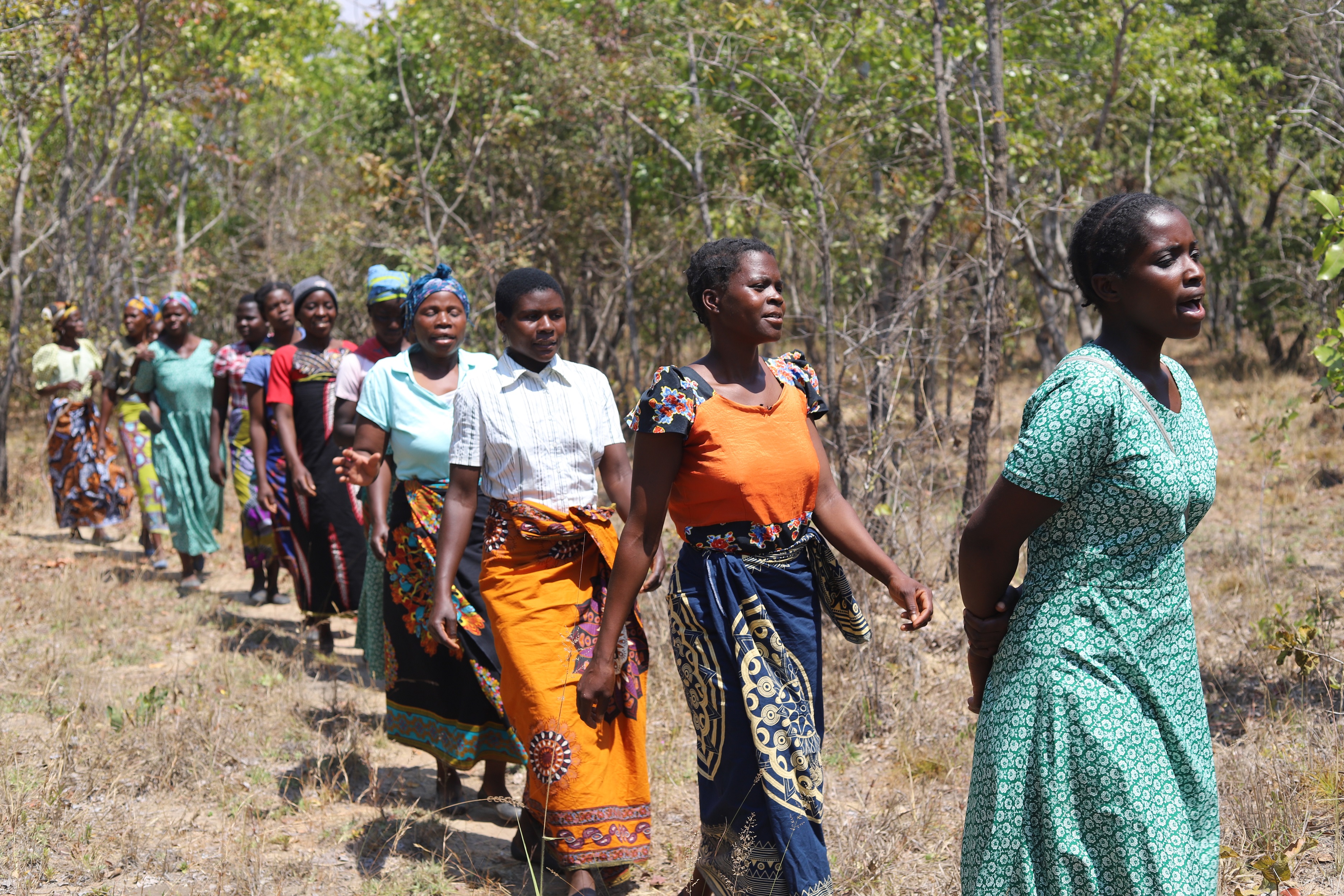
Women of the Eco Women Group have embarked on a tree-planting campaign to promote reforestation programs to reduce the effect of climate change in Kalumba Forest, 37 miles north of Malawi's capital, Lilongwe. (Doreen Ajiambo)
Editor's note: The phrase "just transition" is part of the growing lexicon about moving from an economy based on fossil fuels to clean energy. But this phrase's meaning varies. The term can also mean the need for a just transition to new jobs for those employed in industries such as mining. Catholic sisters are involved along the spectrum of transition efforts.
Sr. Patricia Chimimba remembers when the forest near her convent in this town outside Malawi’s capital, Lilongwe, was so thick with leaves and foliage that one could hardly walk through it.
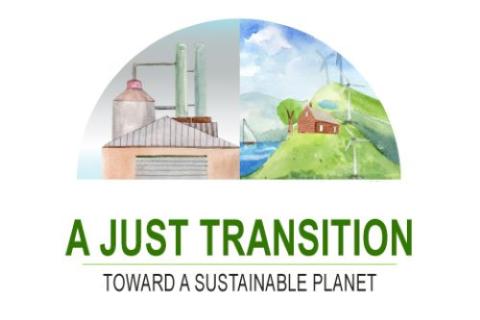
Nowadays, Kalumba Forest, 37 miles north of Lilongwe, is degraded, replaced by grasslands dotted with tree stumps. Religious leaders and environmentalists say that Malawians' dependence on firewood and charcoal as their only source of income and to meet their own energy needs has led them to chop down vast portions of the forest.
The impact of deforestation, including water shortages, reduced crop productivity, and disrupting the hydroelectric power supply has prompted Chimimba, with community groups from the Kapiri area, to protect the Kalumba Forest by planting more trees and advocating to bar illegal loggers.
"I have always loved trees and nature in general, and it pains me a lot when I see people cutting down trees," said Chimimba, a member of the Carmelite Missionary Sisters. "Whenever I wake up, all I think about is the environment and trees, and I think the best way to protect them is by planting more and working to stop encroachers from destroying the remaining ones."
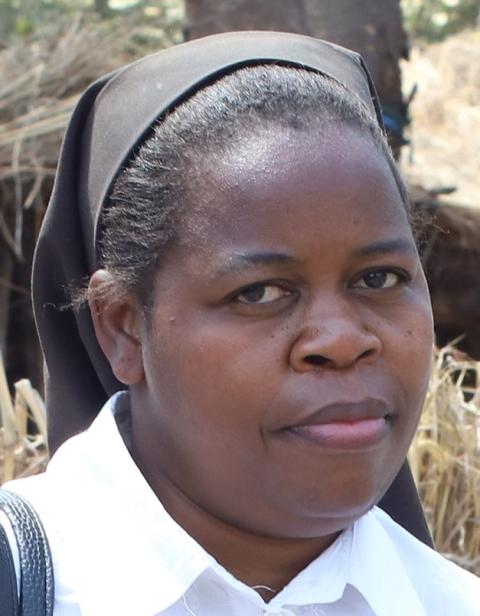
Carmelite Missionary Sr. Patricia Chimimba founded Eco Women Group, a nonprofit organization that empowers women to save the environment in Kapiri, Malawi. (Doreen Ajiambo)
More than 97% of Malawian households depend on biomass energy — charcoal and wood — to meet their power needs, according to the country's National Charcoal Strategy, focused on providing solutions such as promoting substitute cooking fuels. This is because Malawi is ranked the fifth poorest country globally and accessing electricity for cooking is a rare luxury. The majority of those who have electricity still use wood and charcoal for cooking or heating because of the cost, thus exacerbating the health of the forests.
At 2.8%, the southeastern African country of 19 million people has one of the highest annual deforestation rates in Africa, losing 965 square miles (about 250,000 hectares) of tree cover per year, according to government data.
By contrast, Brazil's Amazon rainforest lost 5,100 square miles and reached its highest annual rate of deforestation — a 22% jump over the previous year — in 15 years, according to national space research data released in November.
'I have always loved trees and nature in general, and it pains me a lot when I see people cutting down trees.'
— Carmelite Missionary Sr. Patricia Chimimba
From 1972 to 2009, Malawi lost 36% of its original forest area. Forestation efforts have reduced the net loss to only 5% in that 37-year period, but the biological diversity is not equal to that of original forest. If the trend is not addressed, the nation could find itself without trees by 2079, recent research in the region states.
Deforestation can severely affect wildlife, ecosystems, biodiversity and weather patterns.
Along the highways of this landlocked nation, residents can be seen using bicycle transport to move bags of charcoal for sale as fuel. Women sell charcoal on the streets, and young men and women load large carbon bags for sale to restaurants. Massive deforestation and loss of vegetation due to charcoal production has made many large tracts of land in the countryside lie bare. The land, therefore, offers no resistance against floods and droughts.
Drivers of deforestation
More than two-thirds of Malawi's population live below the international poverty line of $1.90 a day, according to World Bank statistics. The majority of the impoverished depend on small-scale farming for their livelihoods, Chimimba said, adding that the growing population has forced residents to convert forested land to agricultural land.
"Most of the residents here are poor, and sometimes they are forced to cut trees to survive," she said. "They cut trees and produce charcoal to generate income so that they can pay fees for their children and buy food in case there is a drought that results in a poor harvest."
Mary Nankokwe, a Kapiri resident, agreed. Although she knows that it's illegal to cut down trees for charcoal production, a recent prolonged drought that brought starvation and hunger forced her to give up farming in favor of selling charcoal as fuel, she said.
"I used to depend on farming, but due to extreme weather that leads to poor harvest, it made me turn to the sale of charcoal and wood to survive," said the 38-year-old mother of three whose husband died in 2017. “Being a widow, I had to get involved in charcoal burning [making charcoal out of burned wood to sell as heating or cooking fuel] to provide for my children and pay for their fees. I'm very poor, and I don't have other means of providing for myself and my children, so this is the only way. Maybe if I get money, I can start another business."
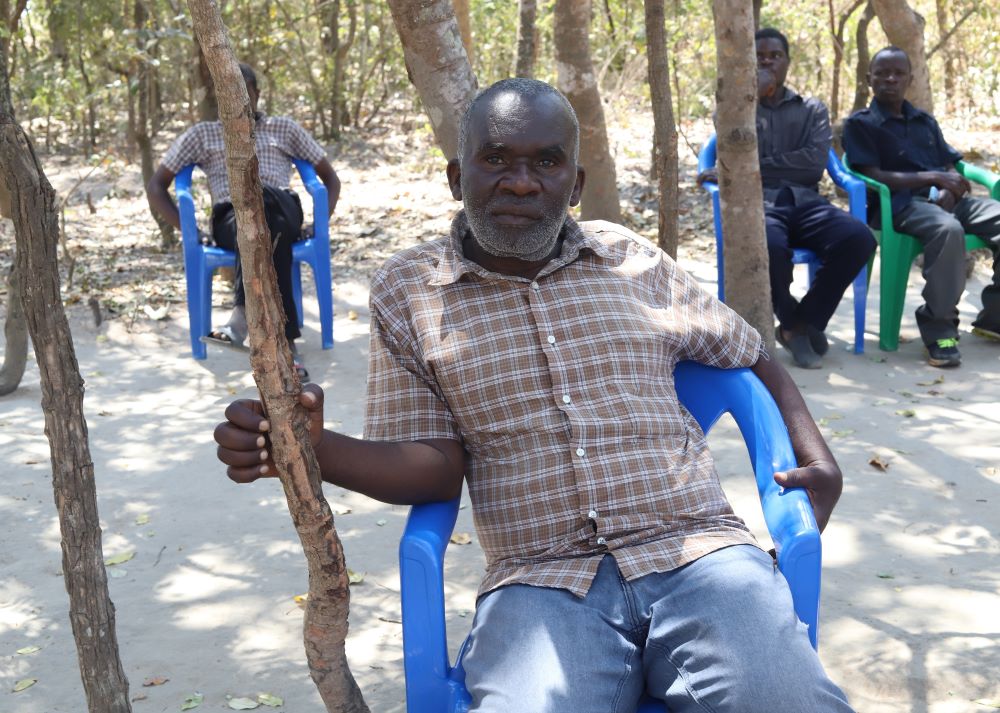
Davis Kunkeyani, a village administrator overseeing Kapiri, says deforestation is caused by many factors, including cooking with firewood brick making and charcoal production. The initiative taken by the sisters is the only way of saving the remaining forest in the region. (Doreen Ajiambo)
Davis Kunkeyani, a village administrator overseeing Kapiri, said most homes in the country are built of bricks fired with wood logged from forests, further contributing to deforestation. Kapiri, like other towns across Malawi, is also in high demand for bricks to construct public structures such as schools, hospitals and trading shops, he said.
Several reports in Malawi show that firing bricks consumes roughly 850,000 metric tons of fuelwood annually. The report said that if the situation is not addressed, the country could lose all its trees in 25 to 30 years from the brick industry alone.
"Bricks require a lot of wood to fire brick kilns, and this leads people to cut down trees to meet the demands," said Kunkeyani, noting that the practice has resulted in massive deforestation, land degradation and soil erosion.
Weak laws
Chimimba said weak laws and enforcement of existing rules have been ineffective.
The country's law states that authorities should take away charcoal and timber from sellers and confiscate equipment for those found cutting down trees.
In its National Charcoal Strategy report, the government admits a need to strengthen law enforcement to end deforestation, noting that in recent decades "law enforcement related to charcoal production and marketing has been inadequate, inconsistent and ineffective."
"The authorities need to do more to save the country's forests, including introducing stiffer punishment for those found cutting trees and selling charcoal and timber," Chimimba said. "Unfortunately, those destroying our forests are walking freely with impunity despite the dangers deforestation has brought to us."
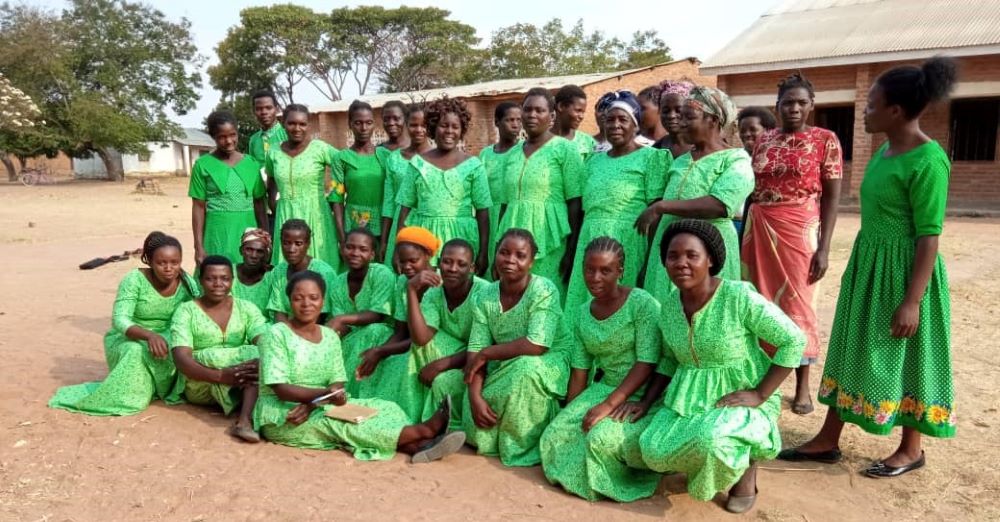
The Eco Women Group wear green to symbolize the environment. The sisters equip these women with skills to make briquettes, practice farming that does not adversely affect the environment and plant trees to reduce deforestation in Kapiri, a region 37 miles north of Malawi’s capital, Lilongwe. (Photo courtesy of Sr. Patricia Chimimba)
Closing the gap
But religious sisters are boldly confronting the deforestation crisis and taking several critical steps toward a solution.
In 2015, Chimimba founded Eco Women Group, a nonprofit organization that empowers women to save the environment. The group equips women with skills to make briquettes, practice apiculture or farming that does not adversely affect the environment, and plant trees to reduce deforestation in the area.
To ensure that they provide an alternative energy source to reduce deforestation, the organization has trained women to make briquettes as a substitute for charcoal. A briquette is a compressed block made from flammable items, such as charcoal dust, sawdust and clay, with an ability to start and maintain a fire, essentially for cooking, explained Chimimba. Due to the lack of resources, women are now using cartons to make the briquettes, she added.
"The initiative has reduced the cutting down of trees, and we are now saving our only forest in the region," said Chimimba, revealing that her organization has more than 600 members divided into 10 groups representing every village in Kapiri. "Using briquettes saves time, as women no longer have to walk for a long distance to look for firewood and is healthier because they don't emit smoke."
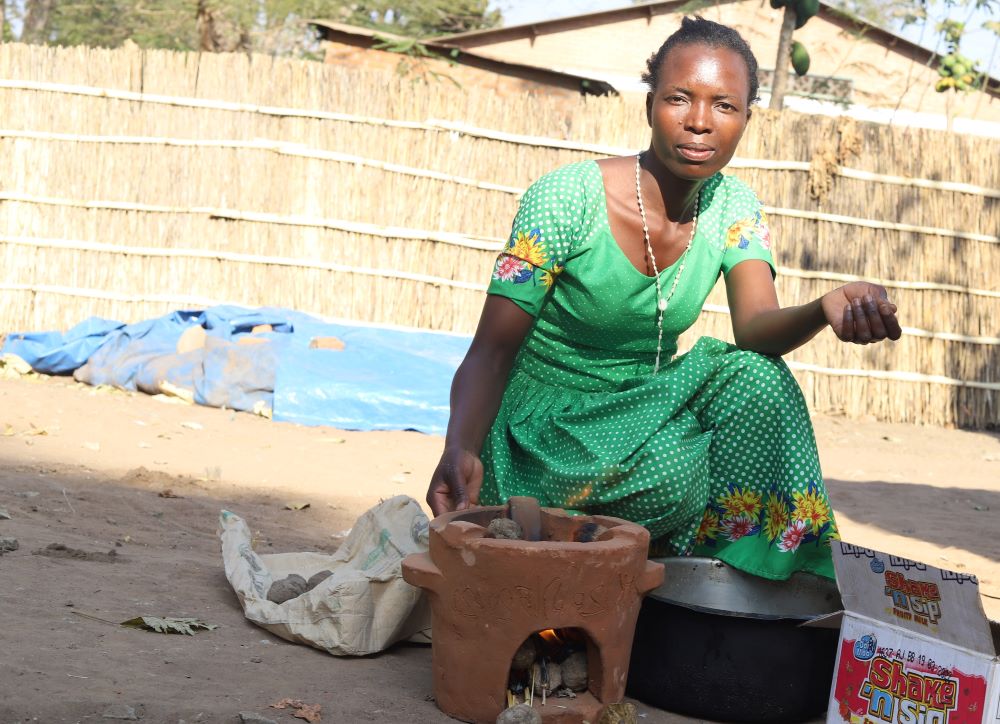
Marlene Usiku, 30, is a member of the Eco Women Group. After training from the sisters, she uses briquettes instead of charcoal or firewood to cook. (Doreen Ajiambo)
Marlene Usiku is among hundreds of women who have received training from the Eco Women Group on making briquettes. She said the product produces fuel in her household and helps her earn a sustainable income.
"We are now using briquettes instead of charcoal or firewood. I'm making more briquettes every day and selling to other households for an income so that I can sustain my family," said the 30-year-old mother of two, who noted that most charcoal producers in the region are women. "We have been encouraged to train other women on how to make briquettes and use it as a clean source of energy to save the forests and also earn an income."
The sisters with the group of women have also planted thousands of trees to replace those that encroachers have cut. For example, early this year, the sisters launched a tree-planting campaign to promote reforestation programs to reduce climate change caused by excess carbon emission in the atmosphere.
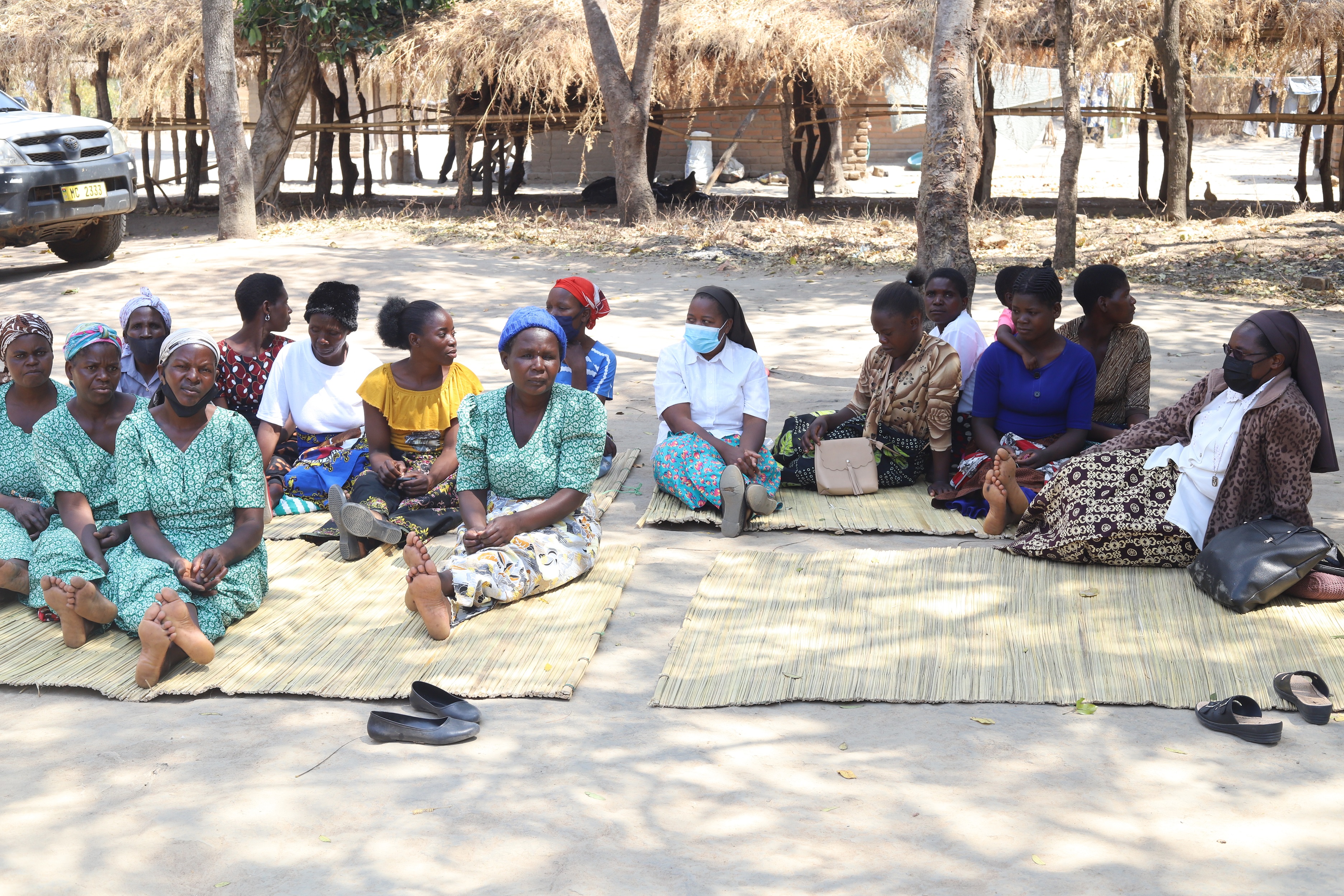
Srs. Marieta Makina (far right) and Patricia Chimimba (in floral skirt) sit with women from Eco Women Group. This nonprofit organization empowers women to save the environment in Kapiri, 37 miles north of Malawi's capital, Lilongwe. (Doreen Ajiambo
Sr. Marieta Makina, a member of the Carmelite Missionary Sisters who works with Chimimba, said they have been training women on plant propagation so that they can establish their tree nurseries, replace trees that have been cut on their homestead and sell the rest of the seedlings to earn an income.
The sisters are determined as well to find the solution to severe drought and hunger. Climate change due to deforestation has significantly affected food production in the country. The sisters are touring villages to train the women's groups about the importance of farming. The thrice weekly training involves land preparation, planting, weed management and new farming methods that can survive the harsh climatic changes.
The sisters provide the women with seeds and train them to create small gardens, Chimimba said, noting that these gardens are meant to provide household food and help the women earn an income from vegetables sales.
Using small buckets of water, the sisters devised an irrigation method where a water tap and pipe that runs through the entire garden is connected to the bucket. The technique enables the vegetables to be watered despite having little water available, Makina said.
"To have food, you don't need a lot of water, and that's why we teach these women that, with little water, they can be able to have food," she said. "This has enabled them even to earn an income, which is a good thing."
Advertisement
The initiatives are helping Kapiri residents move out of poverty as they save the environment.
"Today, I don't think of cutting down trees to make charcoal for sale," Usiku said. "The sisters have taught us to engage in alternative sources of income to take care of our families and save the trees."
Kunkeyani thanked the sisters for saving the only remaining forest in the region and empowering residents, saying that was the only way to end deforestation. "It's important to empower the poor because it's poverty that is making locals destroy our forests," he said.
Meanwhile, Chimimba hopes that the programs they are implementing in Kapiri will spread to other country regions to save the remaining forests.
"We may be a few, and maybe our efforts will not change much, but I believe that others will come to defend the forests," she said. "We will not let Malawi become a desert. It's our responsibility to take care of the environment."







